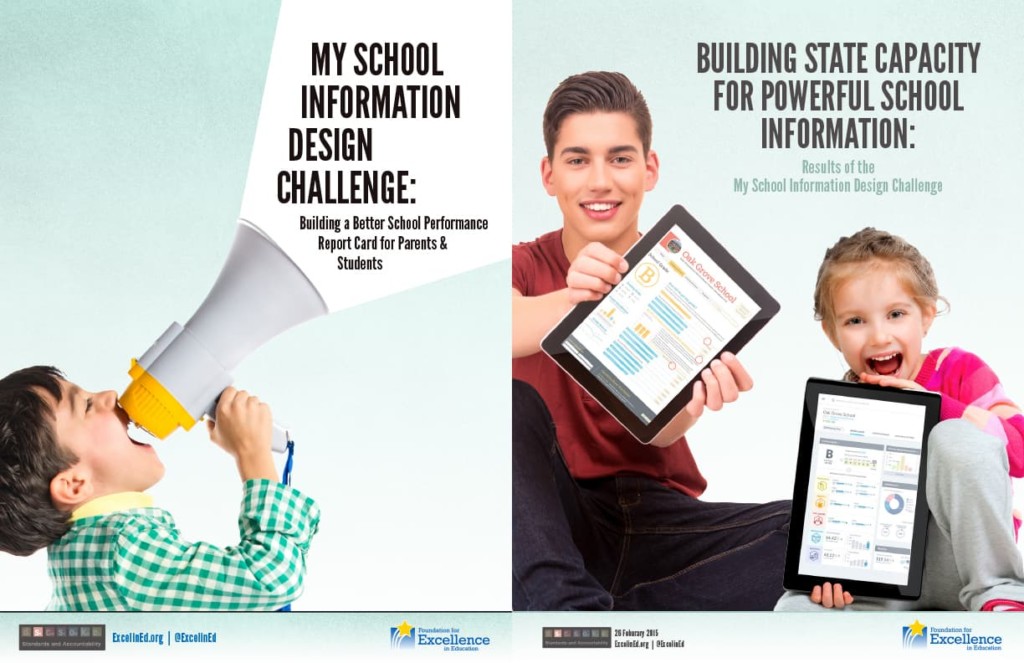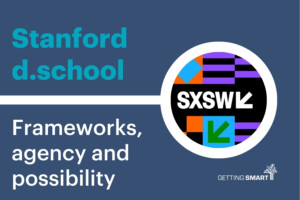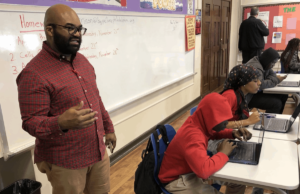How to Transform Convoluted Documents into Accessible School Report Cards

In the Fall of 2014, we worked with our advocacy partner, The Foundation for Excellence in Education (ExcelinEd) to kick off the My School Information Design Challenge. Dozens of talented designers submitted designs and the challenge worked. But that isn’t enough. The real work starts now. States are encouraged to use the designs received to inspire their next-generation report card. Read more in the post below that first appeared on The EdFly Blog.
Elizabeth Emery
The genius of student report cards is that they quickly and effectively inform parents about the performance of their children.
ExcelinEd’s review of school report cards, however, revealed quite the opposite. Many are so convoluted and confusing that it is difficult for parents to determine from them the performance of their children’s schools.
And so we set about trying to fix that. ExcelinEd brought together experts from the education reform world and the design community, charging them to produce report cards that conveyed relevant information about school performance in a simple, eye-catching format that parents would intuitively understand.
We called this effort the “My School Information Design Challenge.’’ Last week, we released the results.
We are following up with this report: Building State Capacity for Powerful School Information: Results of the My School Information Design Challenge. It highlights winning designs and sets forth the key design elements required to build a high-quality school report card. It also aims to leave readers – particularly state-level decision makers – with three main takeaways:
1. The design challenge worked!
This challenge revealed that current school report cards are often convoluted and hard to understand, obfuscating the information they are intended to convey. We demonstrated they could be replaced with modern, simple designs taking advantage of the latest trends in data visualization.
2. Reimagining the way stakeholders consume and interact with school information presents a huge opportunity.
We need an effective way to convey information from new standards, better assessments and other measures of student growth and school performance. This will give parents clear information about school performance so they can select the best educational option for their children. It will give teachers looking for jobs the necessary information to identify the school that best meets their qualifications. It will give policymakers information to guide school accountability decisions and advocates the necessary information to determine whether all children in a district are receiving a quality education.
Also, many anticipate that any reauthorization of the Elementary and Secondary Education Act (ESEA) probably will give states more control over accountability measures, including how they grade or rate schools and identify those requiring intervention. With this new autonomy, states would face an increased need and responsibility to ensure available and transparent school performance information, including data on whether state-led reforms are working.
3. States are in the driver’s seat.
The My School Information Design Challenge has provided design options and new ideas on visualizing school data. It has shown states that, to be effective, their school report cards must have a user-centric design and functionality that empowers action among parents and other stakeholders.
Developing a new, effective school report card is no easy task, but now states have access to a number of resources that can assist them. Organizations like the Data Quality Campaign can provide helpful research and information to support the process of gathering trustworthy and easy-to-understand education data. The report card designs that came from ExcelinEd’s design challenge are free for any state to use or adapt, no paperwork necessary, because of a Creative Commons license. The onus rests fully on states to step forward and begin this process of developing the next generation of school report cards.
Through the My School Information Design Challenge and the research on which it was based, states possess a greater understanding of the need and opportunity to transform their school report cards. They have access to creative ideas and willing assistance to help them reach that goal.
School report cards are getting a new look! #SchoolInfo http://t.co/Q0RfbV44Tx pic.twitter.com/ezc3uSilSH
— ExcelinEd (@ExcelinEd) February 26, 2015
For more information about the My School Info Challenge, check out:
- My School Information Design Challenge: Building a Better School Performance Report Card for Parents & Students
- My School Information Design Challenge

Elizabeth Emery is the Policy Project Manager at The Foundation for Excellence in Education.




0 Comments
Leave a Comment
Your email address will not be published. All fields are required.